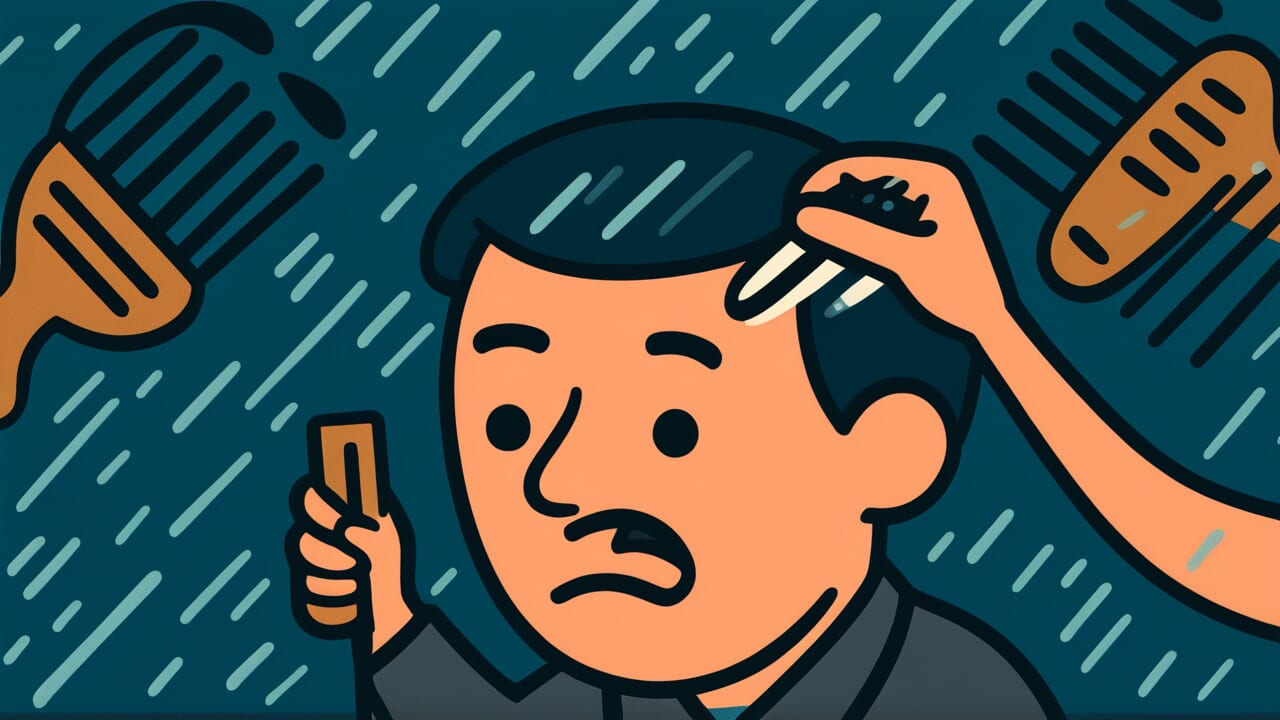How to Read “When the comb doesn’t go through easily, it will rain”
Kushi ga tōri nikui toki wa ame
Meaning of “When the comb doesn’t go through easily, it will rain”
This proverb means that when you try to comb your hair and it feels harder than usual, rain is coming soon.
Before rain falls, the humidity in the air increases. Hair absorbs this moisture and swells up, making it tangle more easily. This is why the comb doesn’t go through smoothly.
This saying shows the wisdom of people who sensed weather changes through their bodies before weather forecasts existed.
When people noticed their comb wasn’t working well during morning grooming, they would prepare to take an umbrella or decide not to hang laundry outside.
Even today, many people experience their hair becoming unmanageable on humid days.
This proverb represents practical life wisdom from a time when natural phenomena and daily life were closely connected.
Origin and Etymology
The exact first written appearance of this proverb is unclear. However, it is considered one of the weather prediction wisdoms passed down among common people in Japan since ancient times.
People in the past developed ways to predict weather from changes around them without meteorological instruments.
Hair is sensitive to humidity changes. When moisture in the air increases, hair expands and spreads more easily.
Before rain, atmospheric humidity rises. Hair absorbs this moisture, swells up, and tangles more easily.
People who combed their hair daily predicted coming rain from this familiar sensation of how easily the comb went through.
Women with long hair likely felt these subtle changes especially keenly during their daily grooming routine.
This kind of life wisdom accumulated through people’s experience and observation before scientific meteorology developed.
Hair functioned as a natural hygrometer. Today we have humidity meters and weather forecasts.
But in the past, people’s own bodies and everyday objects were important sensors that told them about changes in nature.
Usage Examples
- My comb isn’t going through easily this morning. They say when the comb doesn’t go through easily, it will rain, so maybe it’ll rain this afternoon.
- My hair won’t settle down. When the comb doesn’t go through easily, it will rain, they say, so I’d better take an umbrella.
Universal Wisdom
The proverb “When the comb doesn’t go through easily, it will rain” tells the story of how humans have lived as one with nature.
Our ancestors were not observers looking at nature from the outside. They were part of nature, sensing its changes through their own bodies.
This proverb teaches us that the human body itself is a precise sensor that can detect subtle changes in the natural world.
Hair, a part of the body we usually don’t think about, tells us about invisible changes in atmospheric humidity.
This shows the natural dialogue ability that humans originally possessed.
In modern society, all information is digitized and measured by machines.
But people in the past sharpened their senses and paid attention to small daily changes to read nature’s rhythms.
This wasn’t just weather forecasting. It was wisdom for living in harmony with nature.
This proverb has been passed down for so long because it wasn’t mere superstition. It was reliable observation based on actual physical phenomena.
Our ancestors saw the truth through experience, even without scientific explanations.
This proverb contains trust in human bodily senses and a humble attitude toward nature.
When AI Hears This
Hair actually functions as a high-performance humidity sensor. The protein structure of hair has hydrophilic parts.
When these parts absorb water molecules from the air, hair expands by about 2 percent. The essence of this proverb is detecting this physical change through the mechanical interface of a comb.
From an information theory perspective, this is an extremely efficient information acquisition system.
Humans receive atmospheric humidity information as tactile feedback during the daily act of combing hair, without conscious measurement operations. The cost of information acquisition is essentially zero.
Modern smartwatches predict weather using barometric sensors, but they need charging and require looking at a screen.
In contrast, the hair and comb system requires no power and automatically delivers information through the low-load channel of touch.
What’s even more interesting is that this system has the characteristics of a distributed sensor network.
Tens of thousands of individual hairs each detect humidity as independent sensors. Combing integrates this into unified information output.
Even if each individual sensor has low precision, the collection of many sensors generates highly reliable environmental information.
This is exactly the redundancy design that modern IoT sensor arrays aim for. The human body was already a sophisticated information processing device in dialogue with the environment before we were even conscious of it.
Lessons for Today
This proverb teaches modern people the importance of sensitivity to notice familiar changes.
We can instantly know the probability of rain by checking a weather app. But aren’t we missing the small signals our own bodies send?
In modern society, relying on external information has become normal.
However, by sharpening our own senses and paying attention to subtle daily changes, we gain valuable awareness.
Changes in physical condition, subtle atmospheres in relationships, turning points in work flow. The ability to sense these signs is a uniquely human capability that machines cannot replace.
Your body senses more than you think it does. How your body feels when you wake up, your skin condition, how your hair behaves.
These aren’t just coincidences. They might be messages telling you about environmental changes.
While relying on convenient tools, also value your own senses. This may lead to a richer, more refined way of living.



Comments